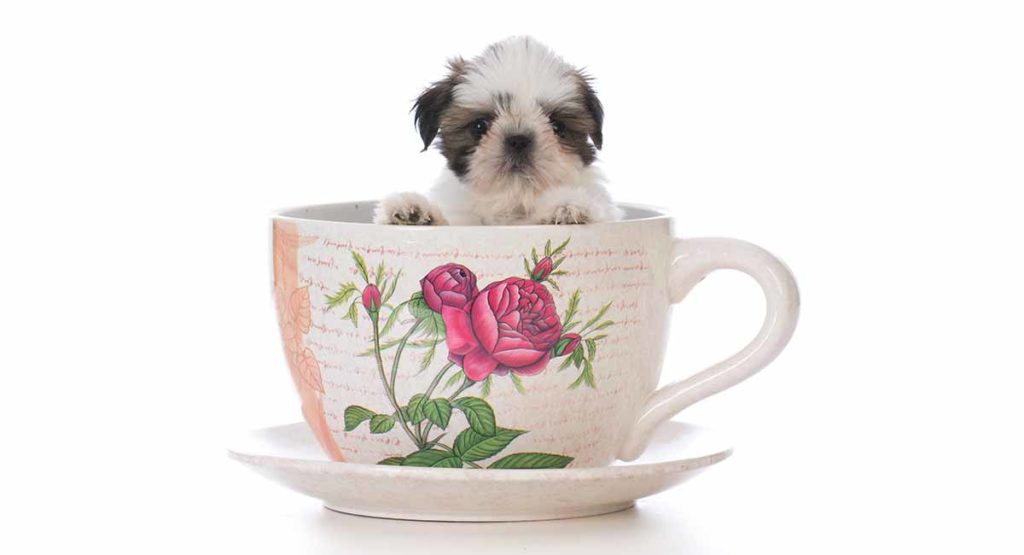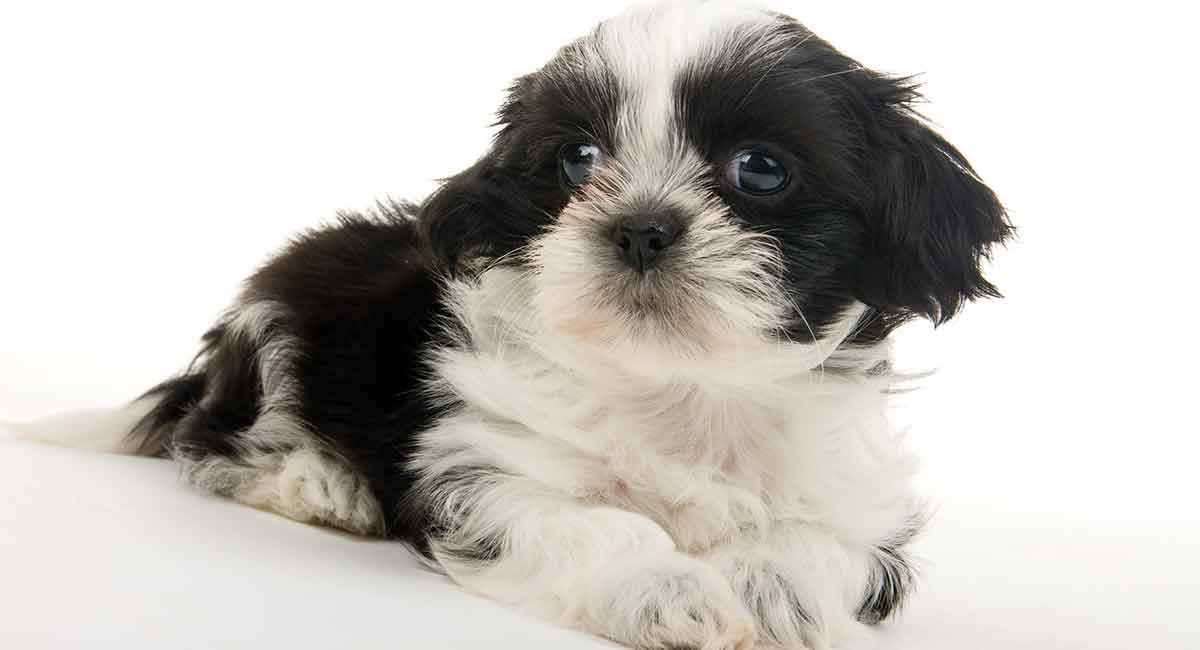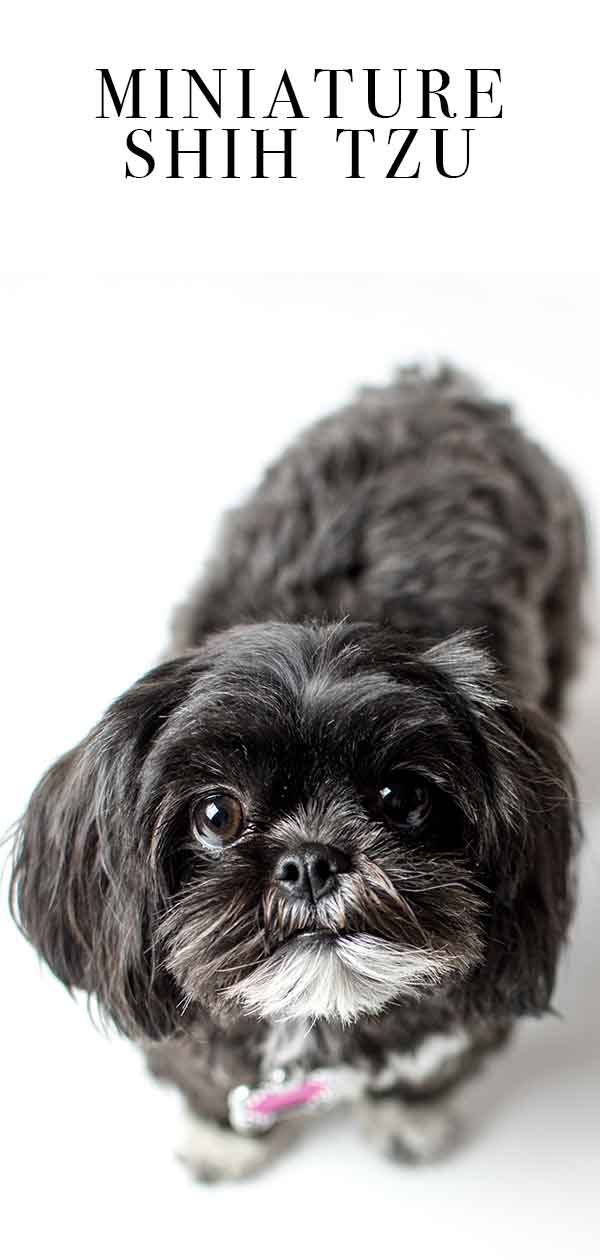
The teacup Shih Tzu is a small, under 9lbs and 9 inches, version of the loyal, affectionate, active little Lion Dog. With their big dark eyes, long flowing coat, and playful breed traits, Shih Tzu dogs have been a favorite lap dog for thousands of years. They are loving, protective and brave. So a smaller, cuter version is the ideal apartment pet, right? Today we’ll check out the potential benefits and health costs of shrinking an already small breed. Although a tiny teacup Shih Tzu has huge appeal, there are reasons you might be better off sticking with the standard, still fairly small, size to fit with your lifestyle, home and family.
Contents
Today we’ll look at how dogs are miniaturized and the potential problems associated with creating tiny dogs like the teacup Shih Tzu. We will look at the ways that dogs are miniaturized and the potential problems associated with creating tiny dogs like the teacup Shih Tzu.
Miniature vs Standard Shih Tzu Dogs
The teacup Shih Tzu is not a separate breed or a variety of the breed. They are simply Shih Tzus who are below the minimum size of the breed standard. Some of these dogs might be just slightly under the normal weight. The problem arises when breeders purposely strive for a miniature Shih Tzu full grown who weighs 5 pounds or less.
Shih Tzus are not meant to be this tiny, and originally the breed was even bigger than the standard dogs of today. An adult Shih Tzu will stand between 9 to 10.5 inches high at the shoulder. They weigh from 9 to 16 pounds. Any dog below 9 inches tall and less than 9lbs as an adult is potentially labelled a teacup Shih Tzu.

What’s the Appeal of a Teacup Shih Tzu?
There’s no question that miniature Shih Tzu dogs are unbearably adorable. There’s a certain appeal to having a dog that retains the appearance of a puppy forever. Unfortunately, there’s an underlying ugliness about how these dogs are produced that some unscrupulous breeders don’t want you to know about.
How Do You Get a Mini Shih Tzu Dog?
You can miniaturize a dog by mixing a standard breed with a smaller breed. The gene that causes chondrodysplasia, or dwarfism, can also be introduced to prevent bones from growing to their full size.
Finally you can create a miniature dog by breeding two purebred dogs who are the smallest, or runts, of different litters. This is the most common way of creating teacup Shih Tzu dogs.
Puppies from Runts
Due to their smaller size, runts are usually weaker and more susceptible to numerous health problems. Breeding two underweight dogs together has a high probability of creating puppies with even more serious health issues. Some of the health problems these tiny animals can face in their lifetime include:
- calcium deficiency
- liver shunts
- heart disease
- hypoglycemia
- dental and gum problems
- seizures
Their small bones are very delicate and easily break. You’ll see plenty of advertisements that use terms like imperial, miniature, teacup, and micro mini.
Despite what some breeders would like you to think, these are merely adjectives to describe Shih Tzus who are smaller than the breed standard. The purpose of creating extremely small dogs is to convince buyers that teacup Shih Tzu puppies are rare and worth more money than the standard version of the breed.

Teacup Shih Tzu Health Problems
The standard Shih Tzu is generally healthy with a lifespan of 10 to 18 years. Like any breed, they are susceptible to certain diseases and health conditions.
Unfortunately, some of the things that are so adorable about this breed also cause them the most problems. For the miniature Shih Tzu, it’s their sweet, snubbed faces and short legs that give them plenty of trouble.
Brachycephaly in Teacup Dogs
The Shih Tzu is a brachycephalic breed. This means they have breathing issues related to their shortened skull and flat muzzle that include:
- collapsed trachea
- elongated palate
- stenotic nares
Although not all Shih Tzus dogs are severely affected by brachycephaly, serious cases can require surgery so they’re able to breathe without restriction.
Backs, Eyes and Joints
The combination of a long back and short legs makes the miniature Shih Tzu prone to intervertebral disk disease (IVDD). This Japanese study found the Shih Tzu is particularly at risk for intervertebral disc herniation.
Back problems can cause a great deal of pain. It also can result in muscle spasms, problems with coordination, and in severe cases, paralysis. The beautiful, large eyes of the miniature Shih Tzu are also at risk for a host of eye issues.
Hip dysplasia is a degenerative joint disease that causes the hip’s ball and socket joint to slip out of place. It is a common problem for many breeds, including the Shih Tzu. And patellar luxation occurs when the kneecap is dislocated. It is particularly prevalent in toy and miniature breeds.
Teacup Shih Tzu Breeders
Even with reputable breeding, sometimes puppies are born who are smaller than average. These littler dogs are often referred to as the runt of the litter. A good breeder might sell this dog with full disclosure, but the dog will not be allowed to reproduce.
Seeing the parents and siblings of the puppy is a good indicator of the care they’ve received and the intentions of the breeder. Also, don’t be afraid to ask questions about their breeding practices.
Reputable breeders will be happy to discuss health issues surrounding teacup breeds. Most significantly, responsible breeders will have screened their stock for health issues like hip dysplasia, patellar luxation, and eye abnormalities.
Avoiding Unscrupulous Breeders
On the other hand, there are disreputable breeders who will purposely breed two runts together to create an entire litter of smaller than standard dogs. Truly despicable is the practice of depriving puppies of nourishment to intentionally stunt their growth.
The practice of purposely miniaturizing is done without regard for the health or well-being of the dog. You might see advertisements for a miniature imperial Shih Tzu or a miniature teacup Shih Tzu.
This is nothing more than a marketing strategy to attract buyers into thinking they’re getting a dog that’s rare. Their puppies aren’t exceptional or unique. They’re just undersized Shih Tzus who may be looking at a lifetime of health issues.
Teacup Shih Tzu Price
You can expect to pay more than you would for a standard sized dog. Pricing for teacup and micro mini dogs can be $2,000 or $3,000. Additionally, some breeders will ask for astronomical amounts in the 5-digit range. Bear in mind that the initial cost is only the beginning.
You will have the usual outlay for food, vaccinations, grooming, annual checkups, toys, and treats. It’s also not unlikely that your pint-sized pup will have more than his share of expensive visits to the vet.

Diana says
I’m looking for a tea cup shitzu female puppy
Lynne says
I’m looking for a teacup Shih Tzu … does anyone know around Minnesota where I can find one?
Patricia Martin says
Has anyone found where to get small (3-5lbs) Shih Tzus?
Sandra says
Looking for Shih tzu teacup
Mine passed6mos ago
I’m retired and would love another one
My puppy was 13yrs old
James Claiborne says
I would recommend adopting a Shih Tzu from an accredited veterinarian or rescue service. We adopted “BRAVEHEART” now “BUD” from “WE CARE FOR ANIMALS” in Mesquite, Nevada from Dr. Peggy’s “Mesquite Veterinary Service” after he was brought there after being abandoned on the Arizona Desert for we don’t know how long. He had mange-maggots-eye infections -was completely blind from his hair so thick and matted, his feet and mouth were both raw and “Fox Tails ” in his hair and body had to be shaved to remove them and cut them out.
He is now one of the best ANIMALS I have ever owned ( BAR NONE) I have owned, dogs-cats-sheep- horses- wild Mustangs and you name it, I have had them. Bud is now 18 lbs. of happy– a service dog -because if I fall ( I’m 86 years old) he will sit and bark until someone comes to help me. He is airplane certified and will be flying to SLC very soon.
If you have never owned a small dog as I had. GET A SHIH TZU. You will not be sorry. OH YES He loves everybody, especially kids. BE BLESSED, ADOPT A SHIH TZU>
Jeff Machiela says
Emma was my best friend and as a service dog she was excellent. She passed away at 17 1\2 years. I miss her so much. She was small at 5 pounds but had a huge amount of love to share. I need to get a new teacup Shih Tzu. I am disabled and don’t have much money, can someone please help me find a new best friend? I don’t care about the color, age, or size, just a new loving dog. Thank-you.
Tammy says
Mine died on May 1, 2023 and I am lost without my baby Bella.
Debbie Gonzalez says
My 13 year old Shih Tzu died a few days ago and I am lost without him. He was a service dog and I took him everywhere I went. I am looking for a teacup Shih Tzu puppy that I can spoil. I would like one with a solid color coat (my “Fooey” was a solid golden color). Any assistance I can get in locating a puppy right away will be very much appreciated.
Thank you.
BJ says
Would like to find teacup shih tzu that is pet quality. I’m retired and looking for a sweet companion i can spoil! Prefer a female and she will be spayed.
Dee says
Looking for a tea cup shih tzu for a loving home. No children. Where do I start?
Debora Hunkapiller says
I’m looking for a Teacup and been looking for a while
Andrea Brost says
My 3 lb female shih tzu passed away yesterday she was11. She was full service dog and emotional therapy for pediatrics. I would love a 3 lbs white and tan female as aw soon possible. She was my life.
Patricia Martin says
Hi Andrea, My heart goes out to you. I lost my 7lb Shih Tzu/Yorkie mix last November. It devistated me. She was the best dog I’ve ever owned. Now I’m looking for a really small Shih Tzu, perhaps 4-5 lbs. Have you found someplace to buy or adopt them?Thank you, Trisha.
Darlene Callaghan says
I want to buy a teacup shihtzu puppy but don’t know where to look.
Thank you
Darlene Callaghan